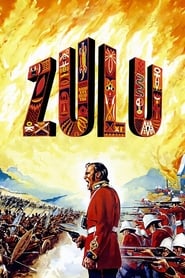Zulu feels like an attempt by the British to create their 'Cowboys and Indians' tale and cash in on the genre's contemporary popularity in Britain and the US. Of course, the classic American Westerns are rather suspect in their view on colonialism and that rather unsavoury aspect is faithfully replicated in Zulu. But it doesn't really work, not least of all because instead elevating a small band of law-abiding US citizens who would love nothing more than to live in peace, Zulu depicts the 'poor' British Army in South Africa as being beleaguered and put-upon by a bunch of noble savages who are refusing to accept Victorian sovereignty over their land.
We learn that the Zulus are really the treacherous ones, as they have gall—the ruddy cheek, you might say!—to use captured British rifles against the British. And the post-battle sequence where they take a roll call (with the silences reflecting the missing British dead) would have you believe that it was the British who were the real victims in this encounter. (Jaime N. Christley in Slant interestingly claims are "essentially using the same blunted logic that dismisses all Hollywood westerns as racist against Native Americans", making the point that the film "is far more interested in geometry than context, in viscera than politics".)
Yet it was beyond the ability of this director to portray the British as innocents whilst committing a 'civilised' massacre. (For a film that almost makes the US Army into the victims of a war crime, see Oliver Stone's 1986 Platoon. Perhaps the British had to destroy the Zulus in order to save them too?) That is to say, whilst Zulu believes itself to be showing plummy officers and loyal men doing their best a long way from home, the film soon becomes an inadvertent critique of the British colonial project. Just to take one example, their ludicrously thick uniforms not only make them completely inappropriate for fighting in the heat of South Africa, but their bright red colour makes them easy to spot from miles away. In this way, the British Army's stubborn insistence on these unsuitable clothes are almost a perfect symbol of the fact that the British Army shouldn't be in South Africa to start with combined with the hubris and self-assurance of their thoughts and actions. Indeed, in some of the exchanges between the officers and men, you can easily discern some of the arrogance that would lead to a bloodbath in the First World War.
Another reason why Zulu doesn't quite work is all of the thoroughly unconvincing fighting (and other cringeworthy acting) communicated with hammy pseudo-regional accents. And there's a strange, almost surreal distance in the tone of the film as well that makes it near-impossible to really engage with — nothing feels 'solid' in a strange way. I thought when Michael Caine's surprisingly effeminate dandy character appeared that we might have an interesting movie on our hands — a kind of Lawrence of Pretoria, perhaps. But it never really comes together and is only slightly redeemed by the lovely widescreen vistas of South Africa. But, yes, Lieutenant Chard might have come to build a bridge, but he ended up committing a war crime.

